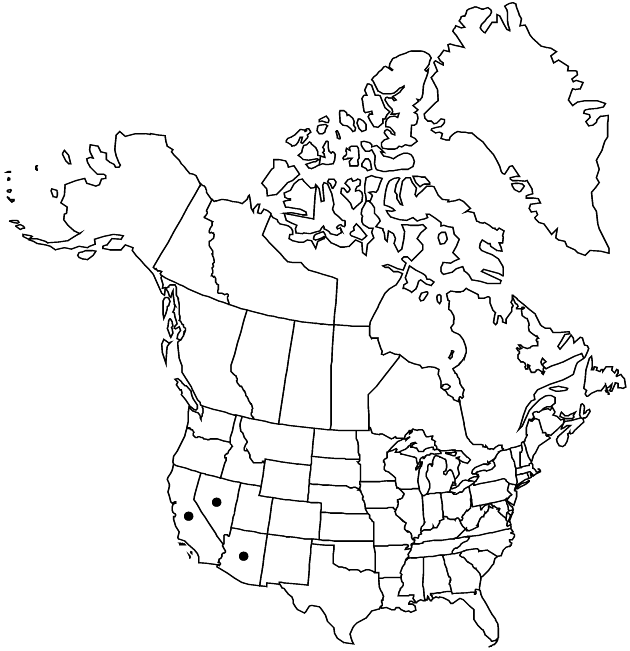Difference between revisions of "Logfia depressa"
Preslia 70: 107. 1998.
FNA>Volume Importer |
FNA>Volume Importer |
||
| Line 30: | Line 30: | ||
|elevation=0–1500 m | |elevation=0–1500 m | ||
|distribution=Ariz.;Calif.;Nev.;Mexico (Baja California;Sonora). | |distribution=Ariz.;Calif.;Nev.;Mexico (Baja California;Sonora). | ||
| − | |discussion=<p>Reported to be eaten by desert tortoises (Gopherus agassizii), Logfia depressa is known from the Mojave Desert and most of the Sonoran Desert (except islands and lower Colorado River valley) including arid Baja California; isolated collections are known from southwestern California and Carson City, Nevada (where recently extirpated).</p> | + | |discussion=<p>Reported to be eaten by desert tortoises (Gopherus agassizii), <i>Logfia depressa</i> is known from the Mojave Desert and most of the Sonoran Desert (except islands and lower Colorado River valley) including arid Baja California; isolated collections are known from southwestern California and Carson City, <i>Nevada</i> (where recently extirpated).</p> |
|tables= | |tables= | ||
|references= | |references= | ||
| Line 54: | Line 54: | ||
|publication year=1998 | |publication year=1998 | ||
|special status= | |special status= | ||
| − | |source xml=https://jpend@bitbucket.org/aafc-mbb/fna-data-curation.git/src/ | + | |source xml=https://jpend@bitbucket.org/aafc-mbb/fna-data-curation.git/src/8f726806613d60c220dc4493de13607dd3150896/coarse_grained_fna_xml/V19-20-21/V19_737.xml |
|tribe=Asteraceae tribe Gnaphalieae | |tribe=Asteraceae tribe Gnaphalieae | ||
|genus=Logfia | |genus=Logfia | ||
Revision as of 15:14, 18 September 2019
Plants 1–5(–10) cm. Stems (1–)3–10+, typically ± prostrate; branches ± leafy between proximal forks, remaining grayish to whitish, lanuginose. Leaves elliptic to obovate, largest 6–8(–10) × 1–2 mm, pliant; longest capitular leaves mostly 0.8–1.5 times head heights, obtuse. Heads in glomerules of 2–5 in ± dichasiiform arrays, ± pyriform, largest 3–4 × 2–2.5 mm. Phyllaries 0, vestigial, or 1–4, unequal, ± like paleae. Receptacles obovoid, 0.9–1.2 mm, heights 1.4–1.6 times diams. Pistillate paleae (except innermost) 7–13 in 2(–3) series, spirally ranked, loosely saccate, incurved 20–60°, somewhat gibbous, not galeate, longest 2.1–3.1 mm, distal 20–50% of lengths glabrous abaxially; bodies (except midnerves) chartaceous, ± terete; wings prominent. Innermost paleae ± 5, spreading in 1 series, pistillate. Pistillate florets: outer 7–13 epappose, inner (4–)10–21 pappose. Bisexual florets 2–5; corollas 1.3–2 mm, lobes mostly 5, yellowish to brownish. Cypselae: outer nearly straight, ± erect, compressed, 0.7–0.9 mm; inner mostly smooth; pappi of (11–)13–15 bristles falling in 1s or 2s, 1.3–2.4 mm.
Phenology: Flowering and fruiting mostly Feb–May.
Habitat: Desert flats, alluvial slopes, loose sandy to gravelly soils, openings among shrubs, often with extra moisture (dry drainages, roadsides), rarely outside deserts
Elevation: 0–1500 m
Distribution

Ariz., Calif., Nev., Mexico (Baja California, Sonora).
Discussion
Reported to be eaten by desert tortoises (Gopherus agassizii), Logfia depressa is known from the Mojave Desert and most of the Sonoran Desert (except islands and lower Colorado River valley) including arid Baja California; isolated collections are known from southwestern California and Carson City, Nevada (where recently extirpated).
Selected References
None.